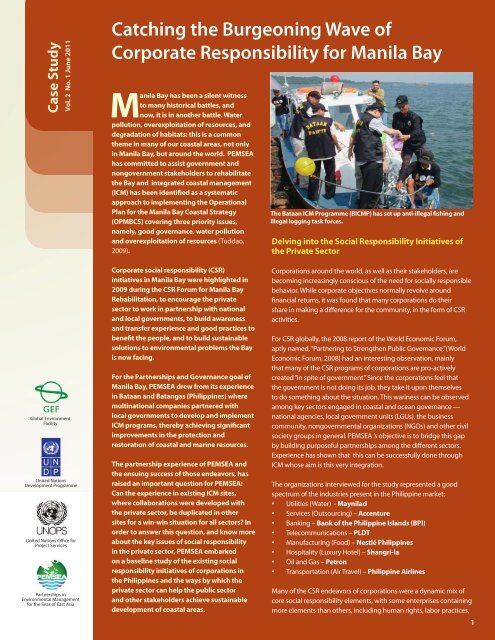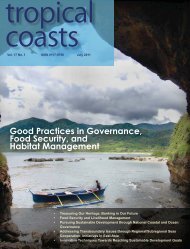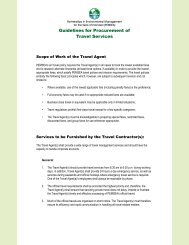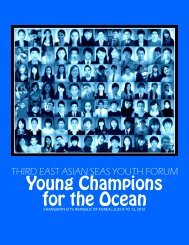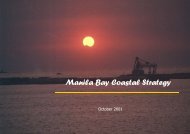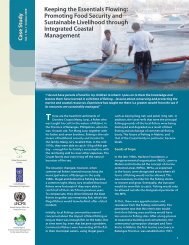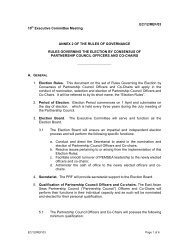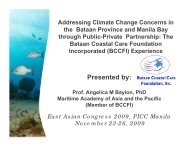Catching the Burgeoning Wave of Corporate Responsibility - Pemsea
Catching the Burgeoning Wave of Corporate Responsibility - Pemsea
Catching the Burgeoning Wave of Corporate Responsibility - Pemsea
Create successful ePaper yourself
Turn your PDF publications into a flip-book with our unique Google optimized e-Paper software.
Case Study<br />
Vol. 2 No. 1 June 2011<br />
<strong>Catching</strong> <strong>the</strong> <strong>Burgeoning</strong> <strong>Wave</strong> <strong>of</strong><br />
<strong>Corporate</strong> <strong>Responsibility</strong> for Manila Bay<br />
Manila Bay has been a silent witness<br />
to many historical battles, and<br />
now, it is in ano<strong>the</strong>r battle. Water<br />
pollution, overexploitation <strong>of</strong> resources, and<br />
degradation <strong>of</strong> habitats: this is a common<br />
<strong>the</strong>me in many <strong>of</strong> our coastal areas, not only<br />
in Manila Bay, but around <strong>the</strong> world. PEMSEA<br />
has committed to assist government and<br />
nongovernment stakeholders to rehabilitate<br />
<strong>the</strong> Bay and integrated coastal management<br />
(ICM) has been identified as a systematic<br />
approach to implementing <strong>the</strong> Operational<br />
Plan for <strong>the</strong> Manila Bay Coastal Strategy<br />
(OPMBCS) covering three priority issues,<br />
namely, good governance, water pollution<br />
and overexploitation <strong>of</strong> resources (Tuddao,<br />
2009).<br />
The Bataan ICM Programme (BICMP) has set up anti-illegal fishing and<br />
illegal logging task forces.<br />
Delving into <strong>the</strong> Social <strong>Responsibility</strong> Initiatives <strong>of</strong><br />
<strong>the</strong> Private Sector<br />
Global Environment<br />
Facility<br />
United Nations<br />
Development Programme<br />
United Nations Office for<br />
Project Services<br />
Partnerships in<br />
Environmental Management<br />
for <strong>the</strong> Seas <strong>of</strong> East Asia<br />
<strong>Corporate</strong> social responsibility (CSR)<br />
initiatives in Manila Bay were highlighted in<br />
2009 during <strong>the</strong> CSR Forum for Manila Bay<br />
Rehabilitation, to encourage <strong>the</strong> private<br />
sector to work in partnership with national<br />
and local governments, to build awareness<br />
and transfer experience and good practices to<br />
benefit <strong>the</strong> people, and to build sustainable<br />
solutions to environmental problems <strong>the</strong> Bay<br />
is now facing.<br />
For <strong>the</strong> Partnerships and Governance goal <strong>of</strong><br />
Manila Bay, PEMSEA drew from its experience<br />
in Bataan and Batangas (Philippines) where<br />
multinational companies partnered with<br />
local governments to develop and implement<br />
ICM programs, <strong>the</strong>reby achieving significant<br />
improvements in <strong>the</strong> protection and<br />
restoration <strong>of</strong> coastal and marine resources.<br />
The partnership experience <strong>of</strong> PEMSEA and<br />
<strong>the</strong> ensuing success <strong>of</strong> those endeavors, has<br />
raised an important question for PEMSEA:<br />
Can <strong>the</strong> experience in existing ICM sites,<br />
where collaborations were developed with<br />
<strong>the</strong> private sector, be duplicated in o<strong>the</strong>r<br />
sites for a win-win situation for all sectors In<br />
order to answer this question, and know more<br />
about <strong>the</strong> key issues <strong>of</strong> social responsibility<br />
in <strong>the</strong> private sector, PEMSEA embarked<br />
on a baseline study <strong>of</strong> <strong>the</strong> existing social<br />
responsibility initiatives <strong>of</strong> corporations in<br />
<strong>the</strong> Philippines and <strong>the</strong> ways by which <strong>the</strong><br />
private sector can help <strong>the</strong> public sector<br />
and o<strong>the</strong>r stakeholders achieve sustainable<br />
development <strong>of</strong> coastal areas.<br />
Corporations around <strong>the</strong> world, as well as <strong>the</strong>ir stakeholders, are<br />
becoming increasingly conscious <strong>of</strong> <strong>the</strong> need for socially responsible<br />
behavior. While corporate objectives normally revolve around<br />
financial returns, it was found that many corporations do <strong>the</strong>ir<br />
share in making a difference for <strong>the</strong> community, in <strong>the</strong> form <strong>of</strong> CSR<br />
activities.<br />
For CSR globally, <strong>the</strong> 2008 report <strong>of</strong> <strong>the</strong> World Economic Forum,<br />
aptly named, “Partnering to Streng<strong>the</strong>n Public Governance,” (World<br />
Economic Forum, 2008) had an interesting observation, mainly<br />
that many <strong>of</strong> <strong>the</strong> CSR programs <strong>of</strong> corporations are pro-actively<br />
created “in spite <strong>of</strong> government.” Since <strong>the</strong> corporations feel that<br />
<strong>the</strong> government is not doing its job, <strong>the</strong>y take it upon <strong>the</strong>mselves<br />
to do something about <strong>the</strong> situation. This wariness can be observed<br />
among key sectors engaged in coastal and ocean governance —<br />
national agencies, local government units (LGUs), <strong>the</strong> business<br />
community, nongovernmental organizations (NGOs) and o<strong>the</strong>r civil<br />
society groups in general. PEMSEA ’s objective is to bridge this gap<br />
by building purposeful partnerships among <strong>the</strong> different sectors.<br />
Experience has shown that this can be successfully done through<br />
ICM whose aim is this very integration.<br />
The organizations interviewed for <strong>the</strong> study represented a good<br />
spectrum <strong>of</strong> <strong>the</strong> industries present in <strong>the</strong> Philippine market:<br />
• Utilities (Water) - Maynilad<br />
• Services (Outsourcing) – Accenture<br />
• Banking – Bank <strong>of</strong> <strong>the</strong> Philippine Islands (BPI)<br />
• Telecommunications – PLDT<br />
• Manufacturing (Food) – Nestlé Philippines<br />
• Hospitality (Luxury Hotel) – Shangri-la<br />
• Oil and Gas – Petron<br />
• Transportation (Air Travel) – Philippine Airlines<br />
Many <strong>of</strong> <strong>the</strong> CSR endeavors <strong>of</strong> corporations were a dynamic mix <strong>of</strong><br />
core social responsibility elements, with some enterprises containing<br />
more elements than o<strong>the</strong>rs, including human rights, labor practices,<br />
1
environment, fair operating practices, consumer issues, and<br />
community involvement and development.<br />
Below is an overview <strong>of</strong> <strong>the</strong> existing CSR initiatives <strong>of</strong> <strong>the</strong><br />
corporations:<br />
2<br />
Nestlé Philippines<br />
(Manufacturing: Food)<br />
Nestlé’s corporate responsibility framework is called “Creating<br />
Shared Value.” Key issues in this endeavor are:<br />
• Nutrition - Nutrition is at <strong>the</strong> very core <strong>of</strong> Nestlé’s existence.<br />
Nestlé educates <strong>the</strong> public about good nutrition and making<br />
nutritious food and beverages available to people with limited<br />
access to it. For example, noting that a significant percentage<br />
<strong>of</strong> Filipino children are deficient in vital nutrients such as iron,<br />
calcium, vitamin C, thiamin and rib<strong>of</strong>lavin, Nestlé has stepped<br />
up efforts to enrich some <strong>of</strong> its popularly priced products with<br />
<strong>the</strong>se nutrients.<br />
• Rural Development - Nestlé Philippines desires to make a<br />
meaningful difference in <strong>the</strong> lives <strong>of</strong> communities where its<br />
factories are situated. For <strong>the</strong> Nestlé Lipa factory, for example,<br />
<strong>the</strong> “Cut and Sew” program was instituted in Barangay<br />
Bagong Pook in which <strong>the</strong> village ladies were given <strong>the</strong><br />
opportunity to learn to sew and sell <strong>the</strong>ir work to <strong>the</strong> Lipa<br />
Factory, an endeavor that has now grown to an enterprise<br />
that generates as much as PhP 1.5 million worth <strong>of</strong> business<br />
every year for <strong>the</strong> residents. Here, residents make use <strong>of</strong> <strong>the</strong>ir<br />
sewing skills to supply <strong>the</strong> factory’s requirements for uniforms,<br />
laboratory gowns, hairnets, shoe covers, and rags. Nestlé’s<br />
rural development also extends to <strong>the</strong> farmers who produce<br />
<strong>the</strong> c<strong>of</strong>fee it manufactures, and <strong>the</strong> youth who make up a<br />
significant percentage <strong>of</strong> its consumers. Beyond <strong>the</strong>se specific<br />
communities, Nestlé is also sensitive to <strong>the</strong> plight <strong>of</strong> families<br />
whose lives have been overturned by natural misfortunes,<br />
coming to <strong>the</strong>ir aid to help <strong>the</strong>m recover from <strong>the</strong>ir losses.<br />
Nestlé’s outreach programs span a wide scope, ranging from<br />
Nestlé has made efforts to enrich <strong>the</strong>ir products to include nutrients<br />
such as iron and calcium. They have also promoted <strong>the</strong> importance <strong>of</strong><br />
drinking milk in various schools.<br />
Used c<strong>of</strong>fee grounds are used by Nestlé for steam generation which<br />
can power factory operations, resulting in cleaner air emissions.<br />
skills training to livelihood opportunities, from disaster relief to<br />
village reconstruction.<br />
• Environment – “Reduce and reuse. Optimize and maximize.<br />
Conserve and preserve. Share and spread.” These are <strong>the</strong><br />
measures by which Nestlé Philippines manifests its care and<br />
concern for <strong>the</strong> environment.<br />
• Reducing and reusing – Since <strong>the</strong> start <strong>of</strong> its Packaging<br />
Source Reduction Program in 1993, Nestlé has saved<br />
a total <strong>of</strong> 13,180 metric tons <strong>of</strong> packaging materials,<br />
cutting down <strong>the</strong> volume <strong>of</strong> solid waste generated from<br />
packaging. Through operational efficiencies and solid<br />
waste management (SWM) initiatives, <strong>the</strong> Company<br />
has likewise reduced unrecoverable solid waste by 13.5<br />
percent. These initiatives include waste segregation,<br />
composting, recycling, and reusing — practices that have<br />
been integrated into <strong>the</strong> day-to-day operations <strong>of</strong> all Nestlé<br />
worksites.<br />
• Water – Nestle’s “reducing and reusing” is applied to o<strong>the</strong>r<br />
resources such as water. For example, <strong>the</strong>ir wastewater<br />
treatment plants in Lipa and Cagayan de Oro factories<br />
produce water clean enough to nurture a pond <strong>of</strong> Koi fish.<br />
The Company has likewise explored several areas where<br />
water can be fur<strong>the</strong>r optimized, leading to <strong>the</strong> reuse <strong>of</strong><br />
sealing water from vacuum pumps, cooling water from<br />
MILO processing, rinsing water, and recovered water from<br />
reverse osmosis plants.<br />
• Energy - Nestlé makes full use <strong>of</strong> available technologies<br />
to convert byproducts in its own backyard into an energy<br />
source. For example, used c<strong>of</strong>fee grounds are used for<br />
steam generation, which can power factory operations,<br />
resulting in cleaner air emissions.<br />
• Conserving and Preserving <strong>the</strong> Natural Environs<br />
- Tree planting – Nestlé has converted factory<br />
backyards into mini-forests, as well as taken part in<br />
community tree-planting projects, adopting parcels <strong>of</strong><br />
land designated for reforestation by local authorities.<br />
- Cleaning up rivers and mountains – Nestlé<br />
employees have fished out garbage from waterways,<br />
picked up trash along mountain trails, planted
amboo trees on riverbanks to prevent soil erosion,<br />
and coordinated with authorities to enforce antilittering<br />
and anti-pollution ordinances in <strong>the</strong>se places.<br />
- Preserving marine life – Nestlé Philippines has also<br />
installed artificial reef modules to help increase fish<br />
population and seeding reef areas with near-extinct<br />
marine species such as giant clams.<br />
Accenture<br />
(Services: Outsourcing)<br />
Accenture has adopted a central focus worldwide called “Skills to<br />
Succeed,” which aims to educate people and help build skills that<br />
enable <strong>the</strong>m to participate in and contribute to <strong>the</strong> economy. In this<br />
regard, <strong>the</strong> company has:<br />
• Transformed <strong>the</strong> audio-visual room <strong>of</strong> <strong>the</strong> Polytechnic University<br />
<strong>of</strong> <strong>the</strong> Philippines (PUP) into a fully-equipped learning facility<br />
called <strong>the</strong> Accenture Ideas Exchange Lab.<br />
• Partnered with <strong>the</strong> Pinoy ME Foundation for <strong>the</strong><br />
implementation <strong>of</strong> a micro-enterprise financing program for <strong>the</strong><br />
benefit <strong>of</strong> Accenture custodians and security guards and <strong>the</strong>ir<br />
families.<br />
• Partnered with <strong>the</strong> Gawad Kalinga Community Development<br />
Foundation, Inc. (GKCDFI) to help provide livelihood programs<br />
for GK communities.<br />
• Initiated an ongoing program to improve <strong>the</strong> elementary<br />
and high school facilities <strong>of</strong> Barobaybay Mission Academy in<br />
Barobaybay, Samar, a fishing community.<br />
• Partnered with French non-pr<strong>of</strong>it organization Passerrelles<br />
Numeriques (meaning “Digital Bridges”) to provide collegeequivalent<br />
Information Technology (IT) education to<br />
underprivileged youth in Cebu and neighboring provinces.<br />
• Helped set up computer laboratories for schools in Pampanga<br />
• Fielded volunteer Accenture trainors to teach programming<br />
technologies in partner schools<br />
• Supported a program, Food for Hungry Minds, in which<br />
volunteer employees <strong>of</strong> Navitaire, a wholly-owned Accenture<br />
business, donate <strong>the</strong>ir time, initiate fund-raising programs and<br />
lend <strong>the</strong>ir expertise to enhance math and science education <strong>of</strong><br />
underprivileged children in community schools.<br />
Accenture also makes an effort to preserve <strong>the</strong> environment and<br />
support environmental initiatives such as tree planting, waste<br />
segregation, habitat conservation, and coastal cleanup.<br />
Bank <strong>of</strong> <strong>the</strong><br />
Philippine Islands<br />
(Banking)<br />
The different CSR activities <strong>of</strong> BPI revolve around three Es:<br />
Entrepreneurship, Education, and Environment.<br />
Entrepreneurship – The Foundation continues to expand its lending<br />
program for capacity building <strong>of</strong> micr<strong>of</strong>inance institutions, which<br />
it pioneered 18 years ago. Beyond extending credit lines for this<br />
purpose, <strong>the</strong> Foundation has tied up with <strong>the</strong> Ateneo de Manila<br />
University to provide training for micr<strong>of</strong>inance institutions on topics<br />
such as financial product design and development, delinquency<br />
management, financial analysis and governance.<br />
Education – Organized in 1989 by <strong>the</strong> BPI Foundation, Inc., with<br />
<strong>the</strong> Department <strong>of</strong> Science and Technology (DOST), <strong>the</strong> BPI-DOST<br />
Science Awards recognizes exceptional science and engineering<br />
students from partner-universities nationwide. These students are<br />
individuals whose efforts made <strong>the</strong>m excel in specialized fields <strong>of</strong><br />
science, including ma<strong>the</strong>matics, physics, engineering, chemistry,<br />
biology, and computer science. The awardees are recognized for<br />
<strong>the</strong>ir potential contributions to industry and nation-building, and are<br />
selected on <strong>the</strong> basis <strong>of</strong> <strong>the</strong>ir academic and research performance.<br />
Bank <strong>of</strong> <strong>the</strong> Philippine Islands has entered into a partnership with<br />
<strong>the</strong> World Wide Fund for Nature (WWF-Philippines) on a Climate<br />
Risk Mitigation Project. (www.angsawariko.com/2010/09/bpi-and-wwfpartner-for-climate-risk.html).<br />
Polytechnic University <strong>of</strong> <strong>the</strong> Philippines<br />
PUP President Dr. Dante G. Guevarra, representing PUP, and Mr.<br />
George Son Keng Po, representing Accenture, during <strong>the</strong> MOA signing<br />
that would transform <strong>the</strong> audio-visual room into a fully-equiped<br />
learning facility. (Israel Balignasay, www.pup.edu.ph/newscenter/go=620).<br />
Environment:<br />
• BPI has teamed up with The World Bank’s IFC and comes on <strong>the</strong><br />
heels <strong>of</strong> an attempt by nations to negotiate an international<br />
agreement to curb carbon dioxide emissions at <strong>the</strong> United<br />
Nations Climate Change Conference in Copenhagen. The<br />
purpose <strong>of</strong> <strong>the</strong> partnership is to scale up lending to projects in<br />
energy efficiency and renewable energy.<br />
• BPI has also forged a partnership with <strong>the</strong> World Wide Fund for<br />
Nature (WWF) on a climate risk mitigation project. The project<br />
aims to generate city-specific socioeconomic baseline data<br />
for selected cities, outside <strong>the</strong> National Capital Region, most<br />
likely to be adversely affected by climate change. The four cities<br />
3
covered for this study are Cebu, Cotabato, Baguio and Iloilo.<br />
The selection <strong>of</strong> <strong>the</strong> cities was based mainly on <strong>the</strong> occurrence<br />
<strong>of</strong> storms, floods, drought and o<strong>the</strong>r extreme climate events<br />
during <strong>the</strong> past decade. Ano<strong>the</strong>r crucial output <strong>of</strong> <strong>the</strong> project is<br />
a template on risk assessment associated with climate change.<br />
The assessment will focus on three elements, namely: hazards or<br />
<strong>the</strong> climate-induced stresses on <strong>the</strong> selected cities; vulnerability<br />
or <strong>the</strong> physical attributes and socioeconomic composition <strong>of</strong><br />
<strong>the</strong> selected cities determining <strong>the</strong> degree <strong>of</strong> <strong>the</strong>ir susceptibility<br />
to <strong>the</strong> effects <strong>of</strong> climate change; and adaptive capacity<br />
characterized by <strong>the</strong> selected cities’ institutional attributes that<br />
determine <strong>the</strong>ir degree <strong>of</strong> capability to respond and adapt to<br />
potential climate change impacts.<br />
Maynilad’s Lingkod Eskwela project involves <strong>the</strong> construction <strong>of</strong><br />
free drinking/wash areas in public schools in <strong>the</strong> West Zone.<br />
Maynilad<br />
(Utilities: Water)<br />
Maynilad has an eclectic mix <strong>of</strong> CSR initiatives ranging from schools,<br />
community programs, emergency preparedness and response, and<br />
<strong>the</strong> environment.<br />
4<br />
• The Expanded Lingkod Eskwela – Maynilad’s Lingkod Eskwela<br />
project is intended for West Zone public schools that have no<br />
access to clean and potable water. It involves <strong>the</strong> construction <strong>of</strong><br />
free drinking/wash areas and regular sampling <strong>of</strong> drinking water<br />
to check its quality.<br />
• Samahang Tubig Maynilad Community Development<br />
Program – Samahang Tubig Maynilad won for Maynilad <strong>the</strong><br />
2010 Anvil Award for Excellence. It is a community development<br />
program that aims to organize communities for new water<br />
service connections and for livelihood projects to enable <strong>the</strong>m<br />
to responsibly manage <strong>the</strong>ir water resource.<br />
• Tubig Para sa Lahat (cause-oriented events) – The Maynilad<br />
CSR project provides potable drinking water to cause-oriented<br />
events such as medical and dental missions, marathons, sports<br />
events and government caravans. It also gives water to disasterstricken<br />
areas.<br />
• Lingkod Ginhawa – The CSR program serves as an on-call<br />
relief arm for events and disasters through massive resource<br />
mobilization <strong>of</strong> employees throughout its business areas. For<br />
example, when two typhoons brought record-breaking rainfall<br />
and unprecedented flooding that ravaged many areas in Metro<br />
Manila, Sou<strong>the</strong>rn Tagalog, and Nor<strong>the</strong>rn and Central Luzon, a<br />
team <strong>of</strong> volunteers from Maynilad, <strong>the</strong>ir family members and<br />
<strong>the</strong> Philippine Air Force worked toge<strong>the</strong>r to produce over 7,000<br />
five-gallon containers <strong>of</strong> potable water for <strong>the</strong> victims. Even<br />
after <strong>the</strong> onslaught <strong>of</strong> Typhoon Pepeng, Maynilad continued to<br />
produce thousands <strong>of</strong> five-gallon containers in order to bring<br />
drinking water to affected communities in <strong>the</strong> West Zone, East<br />
Zone and Nor<strong>the</strong>rn Luzon.<br />
• Lingkod Kalikasan – Maynilad CSR program for <strong>the</strong><br />
environment where Maynilad joins in coastal cleanups and river<br />
cleanup drives (e.g., Kapit Bisig para sa Ilog Pasig), employees<br />
Samahang Tubig Maynilad is a community development program that<br />
enables communities to responsibly manage <strong>the</strong>ir water resource.<br />
engage in tree-planting, and recycle old/damaged electronic<br />
devices (in partnership with Nokia Philippines).<br />
Shangri-la<br />
(Hospitality: Luxury Hotel)<br />
Shangri-la’s CSR initiatives are extensive and well-rounded. They are<br />
one <strong>of</strong> <strong>the</strong> few corporations that cover a very wide range <strong>of</strong> social<br />
responsibility issues, including a human-rights policy <strong>of</strong> hiring people<br />
with disabilities. Below are <strong>the</strong>ir programs:<br />
• Employees – Among many o<strong>the</strong>r initiatives on equal<br />
opportunities and work-life balance, Shangri-La set a policy<br />
that two percent <strong>of</strong> <strong>the</strong>ir employees must be colleagues with<br />
disabilities. The company encourages employee volunteerism<br />
by allowing employees to volunteer during <strong>the</strong>ir work hours<br />
(and not on <strong>the</strong>ir days <strong>of</strong>f) and get paid <strong>the</strong> same rate.<br />
• Stakeholder Relations – Transparency and reporting is highly<br />
valued through regular and open discussions with various<br />
stakeholders especially <strong>the</strong> local community.<br />
• Supply Chain – Shangri-la requires business partners to<br />
have <strong>the</strong> highest standards in environmental, hygiene and<br />
labor practices and encourage practices that align with <strong>the</strong>ir<br />
commitment to Environment, Health and Safety. Suppliers both<br />
at <strong>the</strong> group and hotel level are required to fulfill a Code <strong>of</strong><br />
Conduct and are subject to visits and audits.
construct adequate sewage facilities and water treatment<br />
plants. As is evident from <strong>the</strong>se activities, PLDT is slowly moving<br />
towards more sustainable and multi-sectoral initiatives.<br />
O<strong>the</strong>r CSR initiatives for <strong>the</strong> PLDT-Smart Foundation are:<br />
• Micr<strong>of</strong>inance – The PLDT-Smart Foundation (PSF) supports<br />
micr<strong>of</strong>inance initiatives as a means <strong>of</strong> providing Filipinos with<br />
opportunities to increase economic activity, foster <strong>the</strong> spirit<br />
<strong>of</strong> entrepreneurship, facilitate employment and improve <strong>the</strong><br />
quality <strong>of</strong> lives.<br />
Shangri-La’s Boracay Resort and Spa have ‘embraced’ <strong>the</strong> children at<br />
Yapak High School and introduced a scholarship program.<br />
• Sports – Through partnerships with sports associations, <strong>the</strong>y<br />
support programs ranging from fundraising activities to helping<br />
promote sports at various levels.<br />
• Juvenile Rehabilitation Program – In support <strong>of</strong> <strong>the</strong> Juvenile<br />
Justice Law (RA 9344) and as part <strong>of</strong> its efforts <strong>of</strong> investing in <strong>the</strong><br />
youth, PSF is setting up a juvenile rehabilitation facility that will<br />
be complemented by developmental trainings. Through this<br />
program, <strong>the</strong> PSF hopes to help save children from prison terms<br />
that would only worsen <strong>the</strong>ir plight.<br />
Shangri-La Hotel, Bangkok has become <strong>the</strong> first luxury hotel in <strong>the</strong><br />
city to invest in solar panels for water heating.<br />
• Embrace – The ‘Embrace’ program aims to build, streng<strong>the</strong>n<br />
and sustain local communities through various and specific<br />
education and health projects. Hotels commit to <strong>the</strong>se<br />
beneficiaries over for 10-15 years with <strong>the</strong> goal <strong>of</strong> employing <strong>the</strong><br />
underprivileged youth.<br />
• Sanctuary – Each <strong>of</strong> Shangri-la’s resorts provides a natural<br />
habitat for flourishing biodiversity. The ‘sanctuary’ is Shangri-<br />
La’s project for ensuring <strong>the</strong> highest standards in marine and<br />
terrestrial habitat restoration and environmental conservation.<br />
• Poverty Alleviation – Poverty alleviation is a common thread<br />
running across all <strong>of</strong> <strong>the</strong> PSF’s programs. The PSF works closely<br />
with Philippine Business for Social Progress (PBSP) in its<br />
various community development projects around <strong>the</strong> country.<br />
Specifically, <strong>the</strong> PSF through PLDT and Smart supports <strong>the</strong><br />
Amore Purpose Driven Community in Bicol and seven Gawad<br />
Kalinga Amazing Villages throughout <strong>the</strong> country. Hallmarks <strong>of</strong><br />
<strong>the</strong>se projects include not just provision for housing but also<br />
livelihood projects.<br />
• Disaster Preparedness – The PSF is committed to establish an<br />
active presence in disaster risk management efforts in different<br />
areas <strong>of</strong> <strong>the</strong> country. The program deals with early prediction,<br />
relief and sustainable rehabilitation needs <strong>of</strong> <strong>the</strong> general<br />
community in times <strong>of</strong> calamity. Through <strong>the</strong>se efforts, PSF aims<br />
to help bring hope to families in areas devastated by disasters.<br />
PLDT-Smart Foundation<br />
(Telecommunications)<br />
PLDT’s initiatives are quite extensive. Most interesting is <strong>the</strong>ir<br />
institution <strong>of</strong> <strong>the</strong> Philippine Disaster Relief Foundation (PDRF) for <strong>the</strong><br />
Marikina Watershed with multi-sectoral partners.<br />
• Philippine Disaster Relief Foundation – The idea for this<br />
foundation was triggered by <strong>the</strong> onset <strong>of</strong> Typhoon Ondoy.<br />
The initiative is based on findings <strong>of</strong> wea<strong>the</strong>r and geology<br />
experts that much <strong>of</strong> <strong>the</strong> water that inundated Metro Manila<br />
came down from <strong>the</strong> Marikina Watershed, which today has<br />
only 20-30 percent forest cover. PDRF is also working on o<strong>the</strong>r<br />
issues including: (a) clearing Laguna de Bay <strong>of</strong> water hyacinths<br />
that clog <strong>the</strong> waterway and turning <strong>the</strong>se into fertilizer and<br />
ladies bags; (b) planning to help in <strong>the</strong> dredging and widening<br />
<strong>of</strong> rivers; and (c) talking to key water supply companies to<br />
When typhoon “Juan” slammed into Philippine shores, Cagayan Valley<br />
was first to feel <strong>the</strong> typhoon’s onslaught, with Isabela province taking<br />
<strong>the</strong> brunt <strong>of</strong> it. With over 369,000 affected individuals in Region II, PLDT-<br />
Smart Foundation (PSF), Inc., and <strong>the</strong> Community Relations Division<br />
(ComRel) extended help to <strong>the</strong> region by organizing relief operations.<br />
(www.pldtsmartfoundation.org/Partners/PSF/news/Juanrelief.htm)<br />
5
• Arts – PSF supports various projects that help uplift <strong>the</strong> stature<br />
and quality <strong>of</strong> art made by Filipinos. PSF also supports and<br />
provides opportunities for artists who share <strong>the</strong> purpose and<br />
programs <strong>of</strong> <strong>the</strong> PSF with avenues for community involvement.<br />
Petron Foundation<br />
(Oil and Gas)<br />
Petron Foundation, as part <strong>of</strong> <strong>the</strong> Bataan Coastal Care Foundation<br />
(BCCF), supported <strong>the</strong> Bataan Provincial government in<br />
institutionalizing <strong>the</strong> development <strong>of</strong> <strong>the</strong> Bataan Integrated Coastal<br />
Management Program (BICMP).<br />
Petron has been supportive <strong>of</strong> <strong>the</strong> BICMP from <strong>the</strong> beginning and<br />
assisted <strong>the</strong> LGU with <strong>the</strong> development <strong>of</strong> <strong>the</strong> Bataan Sustainable<br />
Development Strategy (SDS) and <strong>the</strong> Bataan Coastal Land and Sea-<br />
Use Zoning Plan.<br />
Aside from <strong>the</strong> above-mentioned achievements, <strong>the</strong> BCCF, in active<br />
partnership with and support <strong>of</strong> <strong>the</strong> Provincial Government <strong>of</strong><br />
Bataan, has been responsible for key accomplishments towards <strong>the</strong><br />
BICMP, including:<br />
• Increase in number <strong>of</strong> BCCF’s member companies from 17 in<br />
2002 to 23 at present;<br />
• Integration <strong>of</strong> <strong>the</strong> Land- and Water-Use Development Plan for<br />
<strong>the</strong> Municipality <strong>of</strong> Abucay as part <strong>of</strong> <strong>the</strong> Comprehensive Land-<br />
Use Plan;<br />
• Mangrove planting conducted annually, and now covering<br />
a total <strong>of</strong> 45 hectares, with 47,000 seedlings and 337,000<br />
propagules planted;<br />
• Coastal cleanup activities covering 156 km <strong>of</strong> <strong>the</strong> 188-km<br />
coastline <strong>of</strong> <strong>the</strong> province (83 percent);<br />
• Regular Talisay River cleanup, which is a major tributary <strong>of</strong><br />
Manila Bay;<br />
• Establishment <strong>of</strong> <strong>the</strong> Ecological Waste Management Program;<br />
• Establishment <strong>of</strong> artificial reefs (600 units established in Limay,<br />
Mariveles and Orion’s municipal waters) and fish sanctuaries;<br />
• Establishment <strong>of</strong> Bataan as a birdwatching site in <strong>the</strong> Philippines<br />
with 15,700 bird counts and 30 species;<br />
• Campaign against illegal fishing, resulting in <strong>the</strong> arrest <strong>of</strong> 216<br />
suspected illegal fishers and confiscation <strong>of</strong> 22 fishing vessels,<br />
fine-mesh nets and o<strong>the</strong>r outlawed fishing gears from January<br />
to December 2008; and<br />
• Resolution on closure <strong>of</strong> <strong>the</strong> entire Manila Bay against<br />
commercial fishing. (RDC III-RPOC III-RDCC III Joint Resolution<br />
No. 03-01-2008).<br />
Petron Foundation is a partner <strong>of</strong> PEMSEA and has encouraged <strong>the</strong><br />
LGUs in <strong>the</strong> area to take action and institutionalize ICM. The ICM<br />
program in Bataan has enabled Petron to integrate various aspects<br />
<strong>of</strong> its environmental CSR initiatives, and have a sustainable and longterm<br />
solution for <strong>the</strong> environment. Petron Foundation has stressed<br />
that <strong>the</strong> ICM Program, with its five-year implementation plan, has<br />
given <strong>the</strong>m <strong>the</strong> framework <strong>the</strong>y needed for <strong>the</strong> creation <strong>of</strong> <strong>the</strong>ir<br />
Environmental CSR.<br />
Petron’s o<strong>the</strong>r CSR programs are under <strong>the</strong> umbrella program<br />
called Project H.O.P.E.: Helping Filipinos Overcome Poverty through<br />
Education. It is focused on providing a specialized learning program<br />
for <strong>the</strong> underserved children and youth. For <strong>the</strong> children, <strong>the</strong> focus<br />
will be on sending elementary-aged kids from Grades 1 to 6, keep<br />
<strong>the</strong>m <strong>the</strong>re, keep <strong>the</strong>m well, and make sure that <strong>the</strong>y learn. Support<br />
programs for <strong>the</strong> scholars’ parents are also provided. Parallel to this<br />
is <strong>the</strong> building <strong>of</strong> Petron Schools in areas where <strong>the</strong> need for a venue<br />
for education is greatest. The program for <strong>the</strong> youth, on <strong>the</strong> o<strong>the</strong>r<br />
hand, is focused on promoting entrepreneurship among <strong>the</strong> youth<br />
by undertaking, creating, coordinating and acting as catalyst in<br />
entrepreneurship education and development, with <strong>the</strong> end-goal <strong>of</strong><br />
making <strong>the</strong>m creators <strong>of</strong> wealth.<br />
PAL Foundation<br />
(Transportation:<br />
Air Travel)<br />
Philippine Airlines Foundation (PALF) is <strong>the</strong> <strong>Corporate</strong> Social<br />
<strong>Responsibility</strong> (CCSR) arm <strong>of</strong> Philippine Airlines and is an accredited<br />
disaster relief, crisis intervention and welfare organization. PAL<br />
Medical Travel Grants are PALF’s main program for humanitarian<br />
and social development assistance. These enable indigent Filipinos<br />
to go for medical treatment as charity or service patients for serious<br />
health conditions. PALF is <strong>the</strong> Philippines’ coordinator for Mending<br />
6<br />
BICMP coastal activities in Balanga City, Bataan.<br />
PAL Foundation focuses on social development and health.
Kids International which helps indigent pediatric patients with<br />
operable conditions.<br />
PALF is also on <strong>the</strong> board <strong>of</strong> directors <strong>of</strong> <strong>the</strong> Association <strong>of</strong><br />
Foundations, <strong>the</strong> odlest and largest network <strong>of</strong> non-pr<strong>of</strong>its in<br />
<strong>the</strong> Philippines. It is also a trustee <strong>of</strong> <strong>the</strong> Habitat for Humanity<br />
Greater Metro Manila Affiliate, <strong>the</strong> Christian Housing Ministry<br />
which builds homes in partnership with <strong>the</strong> poor. It is a member<br />
<strong>of</strong> <strong>the</strong> Multi-Sectoral Network Against Human Trafficking. The<br />
PAL Foundation has a preferential option for <strong>the</strong> poorest and <strong>the</strong><br />
weakest members <strong>of</strong> society – <strong>the</strong> children, <strong>the</strong> differently abled<br />
and <strong>the</strong> elderly.<br />
Partnerships Can Make Things Happen<br />
or many corporations, not limited to those interviewed, <strong>the</strong> most<br />
popular initiative for coastal care is, logically, coastal cleanup,<br />
which is a very good starting point. Pollution and debris in a<br />
coastal region are good indicators <strong>of</strong>, and symptoms <strong>of</strong>, deeper<br />
issues for <strong>the</strong> area. ICM can give corporations <strong>the</strong> bigger picture<br />
<strong>of</strong> sustainability, have a glimpse <strong>of</strong> <strong>the</strong> roots <strong>of</strong> many problems for<br />
coastal regions, and highlight opportunities through which <strong>the</strong>y<br />
can take part. For corporations dedicated to making a difference,<br />
<strong>the</strong> integrated management approach will grant <strong>the</strong>m avenues<br />
for viable and lasting impacts in <strong>the</strong> environment.<br />
The corporate sector, as observed in <strong>the</strong> study, is a rich resource<br />
in terms <strong>of</strong> manpower, expertise, and economic contributions.<br />
ICM, when implemented properly, creates alliances across <strong>the</strong><br />
many concerned public and private sectors <strong>of</strong> society, and is<br />
<strong>the</strong> framework for integrating <strong>the</strong> corporate sector, potentially<br />
tapping skills and resources for <strong>the</strong> sustainable development <strong>of</strong><br />
coastal areas.<br />
Taking into account what we now know to be <strong>the</strong> expertise and<br />
experience <strong>of</strong> <strong>the</strong> private sector in social responsibility, and <strong>the</strong><br />
experience <strong>of</strong> what has been achieved in coastal regions with<br />
strong public-private partnerships, a few examples <strong>of</strong> ways<br />
by which corporations may assist in ICM development and<br />
implementation can be summarized as follows:<br />
• Actively participating in <strong>the</strong> planning, coordinating and<br />
assessing ICM development and implementation;<br />
• Contributing to <strong>the</strong> shared vision for <strong>the</strong> coastal area <strong>the</strong><br />
development and implementation <strong>of</strong> strategies and o<strong>the</strong>r<br />
plans to achieve that vision;<br />
• Creating corporate initiatives for sustained coastal care<br />
aligned with <strong>the</strong> initiatives <strong>of</strong> <strong>the</strong> local government;<br />
• Supporting management interventions such as solid waste<br />
management, habitat rehabilitation, etc.;<br />
• Instituting multimedia awareness campaigns on ICM and <strong>the</strong><br />
value and benefits <strong>of</strong> marine and coastal resources;<br />
• Providing corporate participation and encouraging<br />
community participation through coastal cleanup drives,<br />
mangrove planting, and o<strong>the</strong>r hands-on activities;<br />
• Campaigning against illegal coastal activities in partnership<br />
with o<strong>the</strong>r major stakeholder groups;<br />
• Aiding coastal communities in risk assessment and<br />
reduction, disaster response and rebuilding operations;<br />
• Supporting and creating livelihood programs; and<br />
• Creating and sustaining environmental sanctuaries in<br />
collaboration with local communities.<br />
PEMSEA’s Next Steps for Public-Private<br />
Partnerships through CSR for Manila Bay<br />
The multi-sectoral partnership process <strong>of</strong> engaging a corporation<br />
through its CSR is akin to establishing public-private partnerships.<br />
An existing framework, <strong>the</strong> PEMSEA PPP Process for <strong>the</strong><br />
development <strong>of</strong> environmental investments, may be used as a<br />
guide towards <strong>the</strong> creation <strong>of</strong> “next action” steps towards CSR<br />
goals in <strong>the</strong> Manila Bay area.<br />
The Stages <strong>of</strong> <strong>the</strong> PEMSEA PPP Process<br />
Stage 1:<br />
Scoping and consensus building<br />
Engaging with all stakeholders is a critical part <strong>of</strong> PPP. Baseline<br />
studies and activities aimed at building consensus among<br />
stakeholders for appropriate policy, regulatory, and institutional<br />
reforms are set at this stage. The aim is to help governments<br />
explore opportunities for public-private partnerships (PPPs) for<br />
<strong>the</strong>ir ICM activities. Due to limited exposure to and experience<br />
with private participation, activities at this stage may include<br />
awareness building, creation <strong>of</strong> projects that can engage <strong>the</strong><br />
private sector, awareness-building <strong>of</strong> positive experiences<br />
with PPPs, and a comprehensive addressing <strong>of</strong> all stakeholders’<br />
concerns.<br />
Stage 2:<br />
Packaging, promoting and networking<br />
PEMSEA’s CSR endeavors will build on <strong>the</strong> Manila Bay initiative in<br />
<strong>the</strong> Philippines. In order to package <strong>the</strong> needs <strong>of</strong> Manila Bay for<br />
corporations, local government units in <strong>the</strong> surrounding areas<br />
will be encouraged to create <strong>the</strong>ir initial action plans for ICM<br />
initiatives and identify <strong>the</strong> areas where corporate partnerships<br />
would be beneficial. These action plans may include <strong>the</strong> setting<br />
up <strong>of</strong> project management <strong>of</strong>fices, monitoring systems, and<br />
on-<strong>the</strong>-ground participation needed for specific activities (e.g.<br />
volunteers for cleanups, mangrove planting activities, information<br />
and education campaigns, etc).<br />
Stage 3:<br />
Roundtable and selecting partners<br />
At this stage, opportunities and avenues for interaction <strong>of</strong><br />
corporations and LGUs toge<strong>the</strong>r will be provided. Dialogues and<br />
roundtable discussions between <strong>the</strong> sectors may be established<br />
and <strong>the</strong> interaction will provide <strong>the</strong> opportunity for corporations<br />
to create partnerships for sustainable endeavors. Corporations<br />
expressing support for <strong>the</strong> Manila Bay Coastal Strategy will be<br />
invited to dialogue with <strong>the</strong> local government units surrounding<br />
Manila Bay.<br />
7
Stage 4:<br />
Partnership building<br />
Following <strong>the</strong> roundtable, follow-on talks will continue to be<br />
coordinated and partnerships will be forged between LGUs and<br />
corporations for ICM initiatives in <strong>the</strong> Manila Bay Area.<br />
Stage 5:<br />
Institutionalizing partnership arrangements,<br />
and developing and adopting a business plan<br />
Once corporations and local government units come<br />
to an agreement, institutionalization <strong>of</strong> <strong>the</strong> partnership<br />
arrangements with a Memorandum <strong>of</strong> Agreement between <strong>the</strong><br />
parties concerned will follow. This is to ensure sustainability <strong>of</strong><br />
endeavors and areas <strong>of</strong> cooperation for <strong>the</strong> benefit <strong>of</strong> longterm<br />
impacts for Manila Bay.<br />
Stage 6:<br />
Improving and sustaining<br />
The partnerships established in Stage 5 shall continue to be<br />
monitored by PEMSEA. As an incentive for corporate partners,<br />
a CSR Awards system will be developed and implemented in<br />
accordance with <strong>the</strong> following:<br />
• An Evolution Partner<br />
As <strong>the</strong> introductory level <strong>of</strong> partnership, <strong>the</strong> Evolution<br />
Partner level will focus on partnership arrangements with<br />
<strong>the</strong> local government as well as participation in planning<br />
for sustainable development aspects in <strong>the</strong> local coastal<br />
area.<br />
• A Revolution Partner<br />
The next level <strong>of</strong> partnership will involve measures for<br />
active participation in coastal governance . In addition<br />
good practices in management <strong>of</strong> marine and coastal<br />
resources shall be taken into consideration.<br />
• A Resolution Partner<br />
The highest level <strong>of</strong> partnership, as institutionalized by<br />
<strong>the</strong> LGU, is awarded to corporate partners <strong>of</strong> LGUs for<br />
ICM programs that have had a positive impact among<br />
stakeholders in <strong>the</strong> community (e.g., social, economic, and<br />
environmental).<br />
These levels will be based on <strong>the</strong> participation <strong>of</strong> corporations<br />
in <strong>the</strong> different ICM programs <strong>of</strong> LGUs around Manila Bay.<br />
Conclusion<br />
The foregoing shows that CSR initiatives <strong>of</strong> <strong>the</strong> Philippine<br />
<strong>Corporate</strong> Industry are definitely showing signs <strong>of</strong> life, compared<br />
to <strong>the</strong> preceding decade, and can be incorporated readily into<br />
public sector initiatives for <strong>the</strong> community. The <strong>Corporate</strong><br />
Governance Watch 2010: <strong>Corporate</strong> Governance in Asia by<br />
<strong>the</strong> Asian <strong>Corporate</strong> Governance Association (2010), scores<br />
<strong>the</strong> performance <strong>of</strong> companies in seven areas: discipline,<br />
transparency, independence, accountability, responsibility,<br />
fairness, and social responsibility. The study placed <strong>the</strong><br />
Philippines at <strong>the</strong> bottom <strong>of</strong> its list <strong>of</strong> 11 Asian countries while<br />
none <strong>of</strong> <strong>the</strong> Asian countries ranked reached <strong>the</strong> International<br />
Best-Practice score <strong>of</strong> 80 percent.<br />
This is an opportunity for <strong>the</strong> corporate sector and LGUs who<br />
can catch <strong>the</strong> burgeoning wave <strong>of</strong> CSR, not only for Manila<br />
Bay, or <strong>the</strong> Philippines, but for Asia. PEMSEA’s ICM experience<br />
with local governments provides <strong>the</strong> niche that is needetd<br />
for forging partnerships between <strong>the</strong> local government and<br />
<strong>the</strong> corporate sector. By building multi-sectoral partnerships,<br />
various projects and resources may be pooled toge<strong>the</strong>r towards<br />
a common vision, hereby maximizing <strong>the</strong> impact. Stand-alone<br />
initiatives <strong>of</strong> government and corporations have admittedly<br />
done much good, but PEMSEA’s experience with its various ICM<br />
programs across <strong>the</strong> region have proven that for multi-sectoral<br />
partnerships, <strong>the</strong> whole is greater than <strong>the</strong> sum <strong>of</strong> its parts.<br />
Prepared by Melissa Cruz, PEMSEA.<br />
The author would like to acknowledge <strong>the</strong> interview participants<br />
who have been generous with <strong>the</strong>ir time and have been instrumental<br />
in <strong>the</strong> preparation <strong>of</strong> this report: Accenture: Mr. Emerson Enriquez<br />
(<strong>Corporate</strong> Citizenship), Ms. Marilyn Siy (<strong>Corporate</strong> Citizenship/Quality<br />
Management); BPI Foundation: Mr. Randy G. Maranan (Executive<br />
Director), Ms. Myra G. Almogino-Calara (Manager/Program Officer);<br />
Maynilad: Ms. Risse Aquino-Jose (Head, <strong>Corporate</strong> Social <strong>Responsibility</strong>);<br />
Nestle Philippines: Mr. Jess Reyes (Safety, Health, & Environment Head);<br />
Petron Foundation Inc.: Ms. Marilou Erni (Executive Director), Mr. Allan<br />
Victorino (Project Officer); PLDT-Smart Foundation: Mr. Butch S. Meily<br />
(President), Mr. Mon R. Isberto (Head – Public Affairs and <strong>Corporate</strong><br />
Communication), Ms. Mia Sebastian (Philippine Disaster Recovery<br />
Foundation); and Shangri-la Hotels and Resorts: Ms. Patricia Gallardo<br />
(Director <strong>of</strong> <strong>Corporate</strong> Social <strong>Responsibility</strong> and Sustainability).<br />
8<br />
For comments and suggestions, please contact:<br />
Partnerships in Environmental Management for <strong>the</strong> Seas <strong>of</strong> East Asia<br />
(PEMSEA)<br />
P.O. Box 2502, Quezon City 1165 Philippines<br />
Tel.: (+63 2) 929 2992<br />
Fax: (+63 2) 926 9721<br />
Email: info@pemsea.org<br />
www.pemsea.org<br />
References<br />
Asian <strong>Corporate</strong> Governance Association, 2 September 2010 . “CG Watch<br />
2010: <strong>Corporate</strong> Governance in Asia”. Available at: www.acga-asia.<br />
org/public/files/CG_Watch_2010_Extract_Final.pdf.<br />
Tuddao, Vicente B, 2009. Operational Plan for Manila Bay Coastal Strategy”,<br />
Presented during <strong>the</strong> East Asian Seas Congress, 25 November 2009,<br />
Manila, Philippines. Available at: pemsea.org/eascongress/specialevents/corporate-social-responsibility-forum/presentation_csr_<br />
tuddao.pdf<br />
World Economic Forum, January 2008 . “Partnering to Streng<strong>the</strong>n Public<br />
Governance: The Leadership Challenge for CEOs and Boards”, p. 15.


